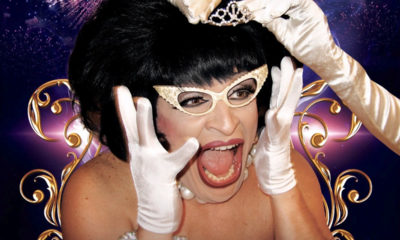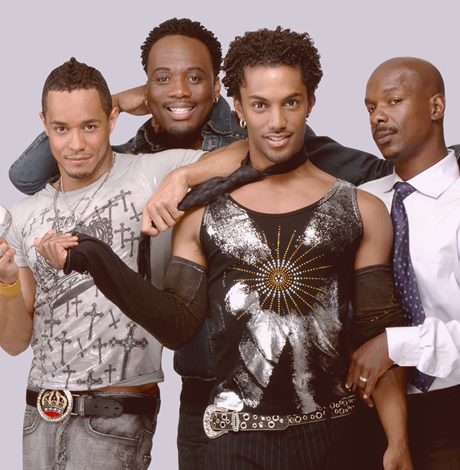Arts & Entertainment
Drama queens
Logo’s ‘A-List’ returns Monday; cast dishes on Reichen’s full-frontal pics, ‘evil’ Austin; Crews follow cast six days per week

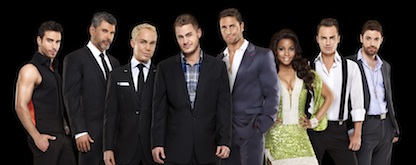
The cast of Logo’s ‘A List: New York’s’ second season, which returns Monday night. From left are Rodiney Santiago, Mike Ruiz, Ryan Nickulas, Austin Armacost, Reichen Lehmkuhl, Nyasha Zimucha, Derek Saathoff and TJ Kelly. (Photo courtesy of Logo)
It’s the show gays love — and love to hate. But many, of course, end up watching anyway.
TV’s gayest, guiltiest pleasure — even its creators embrace the “guilty pleasure” label — is back. “A List: New York’s” second season debuts Monday at 10 p.m. on Logo. The entire season one cast returns for 11 new episodes, this time with a gal pal in tow. The Blade spoke with the cast and crew to get the lowdown on the new season, find out what it’s like shooting the controversial series and ponder the show’s appeal.
The reality show, from the same people (True Entertainment) who brought “Real Housewives of Atlanta” to the air, debuted last October and follows the lives of five gay (and one bi; six total) men in New York who claim they’re at the top of the Manhattan social totem pole through their lives, loves and career ventures. Reality show vet Reichen Lehmkuhl (he won the fourth season of “Amazing Race” and formerly dated Lance Bass) unofficially heads the cast. A central theme of the first season was his tempestuous relationship with Brazilian model Rodiney Santiago, with troublemaker Austin Armacost never missing an opportunity to keep their social pot stirred.
It was a hit and helped, along with “RuPaul’s Drag Race,” put Logo, which debuted in 2005, on the pop culture map. The channel, owned by Viacom’s MTV Networks, won’t release ratings for the show but says it’s the second-highest rated show in the gay channel’s history (after “Drag Race”). A Dallas-based spin-off is planned for a fall debut.
The show’s reception has been wildly mixed. Some reviewers and fans say it’s great to see a gay-centric reality show instead of a mainstream show with token gay characters. Others have been appalled at what they say is a superficial and stereotype-laden cringe fest. Still others agree with that assessment but admit it’s well constructed and addictive.
Executive producer Dominic Pupa, who’s gay, says the show is “absolutely” a guilty pleasure and says the critical drubbing doesn’t mean it’s not successful at what its creators are aiming for.
“People roll their eyes all the time, but it captures people’s attention because it’s three things — people with means and access who live in New York. That trifecta of factors means it’s fascinating to watch. There’s something fun about people who are of means and do have access and discovering their lives can be just as exciting, dramatic and disappointing as yours. Plus it’s an ensemble show and people love ensembles because they can pick their favorite and tune in to see how they’re faring. Even the ones people hate — I hate to say character because it’s reality, but in the sense of being a dramatic narrative, they do sort of become characters — you still love to watch the ones you hate.”
Reichen, during a gym break (it’s legs-and-shoulders day; he goes seven days a week), says he learned early on to let go of the naysayers. It was also hard, he says, watching the first season and seeing how much was left out that would have added context to some of the less-flattering scenes.
“I used to read the blogs but then half way through, I stopped. I got rid of my Google alert and I have become a much happier person,” he says. “I kind of live in my own world. There were so many comments about my relationship with Rodiney, they said I didn’t care about him, I just brought him here and dropped him, but the truth is I made sure he had everything he needed and every opportunity he wanted and you know got him on his feet so he could pursue the stuff he wanted to do. It was such a slap in the face to watch this kind of play out in a very one-sided way … Rodiney knew it too. He was like, ‘Oh my god, he tried his best and Reichen’s not like that with me at all.’”
Letting go of the negative energy has centered Reichen in other ways, he says. It helped him shrug off the full frontal nude photos that surfaced recently of him. He admitted the photos — shot from the neck down — are of him.
“If that had happened five years ago, I think I would have shut myself into a mental institution,” he says. “But now my skin is so thick, I knew as soon as they surfaced, there would be every possible reaction. People would make fun of me, they would hate me, some people would like them — you just get to a point where you can deal with it whether it’s good or bad. It totally sucks that they surfaced without my permission — it was supposed to be a private thing, not something I broadcast for the whole world … but I wasn’t gonna pull an Anthony Wiener and lie about it. I was like, ‘Yeah, it’s me, go ahead and start shooting your arrows and let’s get it over with.’ I did mention that a lot of gay men do this kind of thing. I don’t feel I did anything immoral or illegal. It just so happens that because it was me, people cared.”
Rodiney agrees the show complicated their dating life and admits he was naïve about what he was getting into when he signed on.
“Last year was not easy for me,” he says. “It was very intense. It’s like I do the show and I forget I have the cameras with me but it’s who I am and they’re shooting me. There were a lot of difficult people who liked to create drama in my life. I’m the kind of person who just wants to live my life and not worry about somebody else’s life.”
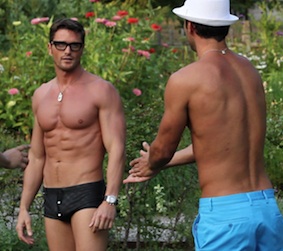
Reichen Lehmkuh (left) and his then-boyfriend Rodiney Santiago in a scene from the show’s first season. (Photo courtesy of Logo)
The couple broke up in November, shortly after the first season started airing. Rodiney admits the show was a factor. Might they still be together without “A-List”?
“I’d say it was half and half,” he says. “The show helped us to break up. We started to date and moved to New York together just six months into the relationship. It was very stressful for us. I can’t handle that.”
Reichen says he and Rodiney are now “friends in the best way possible” and says the second season has been much easier to shoot since he’s not in a relationship.
“It’s been more focused on my business ventures,” he says. “When it comes to the drama, I’ve been off the pedestal in the best way possible.”
New this season is 25-year-old Nyasha Zimucha, a straight entrepreneur and mega-achiever who runs her own business, hair-and-wig shop Embrace Your Hair. She was previously a judge on Little Miss Perfect. She’s a native of South Africa and came to the United States in 2001. She’s been in New York three years and knew “A-List”-er Mike Ruiz before joining the cast.
She says her presence adds an interesting punch to the new season.
“I think you’re going to be very entertained at how some of these relationships develop, both positive and negative,” she says. “It’s an interesting mix. Here you have this straight black girl with these six white, very handsome, very accomplished gay men. I think it’s historic because there’s really been nothing like it on television. You’re going to see not just the fights but the fun too, and I think that will be fun for the audience.”
The second season is still taping even as its first episodes are set to air. Three are fully edited and in the can. Pupa says he doesn’t know how long they’ll shoot — until he feels they have enough footage to bring the storylines to a sensible conclusion.
So how organic or contrived are the scenarios and does editing, obviously a necessity, sometimes distort the narrative?
“Like on any show, we like there to be a beginning, a middle and an end,” Pupa says. “You want to see the cast members start somewhere and end somewhere else. For each one it’s different. Last season we were still shooting until 10 days before the last episode, which is really unusual for this type of show … but it’s a lot more real than people think. They think it’s all very planned out but it’s really not. We ended last season with an argument between Austin and Reichen. That happened less than two weeks before it aired.”
None of the participants were contractually obligated to return for the second season. And the producers don’t tell them they have to meet with certain people or attend certain events. They take suggestions, though, and say they want to do their part to make the show as compelling as possible.
“It’s a nice relationship with cast and production,” Reichen says. “We all understand the result is trying to create something that people will want to watch.”
Camera crews follow cast members six days per week for about 10 hours each day when the show is shooting. Pupa says the cast does its best to schedule things more likely to be interesting when the show is shooting and save the boring stuff — like meeting with lawyers for their business ventures — off-camera. Reichen, for instance, says he traveled much of the six months between the two seasons, though he did see all the cast members at least once during that time, most often at charity events, which he says draw little media attention. He guesses he was only in New York for about 60 days of that six months. He’s been busy prepping a new book and getting ready to launch a fragrance line.
Often the best moments happen when the full cast is together.
“That’s when we have the greatest dynamic,” Pupa says. “Everybody loves Ryan. If he’s throwing a party, you know the whole cast will be there. If Austin throws a party, we don’t know who will walk through the door.”
And what about Austin — is he really the troublemaker he seemed to be from season one?
Reichen says there’s “some stuff” between them that goes down in season two. “You’ll just have to watch,” he says.
Rodiney has a tougher assessment.
“I don’t trust him and we cannot be friends,” he says. “He’s the kind of person I want him far away from my life. He’s evil and he does crazy stuff and I don’t want him part of my life.”
Pupa says Austin is reality’s answer to characters like Alexis and J.R.
“The golden rule of docu soap TV is that just because someone is hated doesn’t mean they’re not watchable,” he says. “It’s a Joan Collins thing for sure. Sometimes you don’t want to admit to liking Austin, but you love watching him.”
Nyasha says the title is a bit of a misnomer and says the show ultimately works because it’s real and people from all walks of life can relate.
“What it’s really about is interesting, dynamic people living in New York,” she says. “Some have great careers and some ain’t doing nothing, but it unfolds as great TV because it’s honest. Even a young straight woman can relate to this or that. Some might think, ‘I don’t relate, what the hell am I doing watching this crap?’ but any level of negative is part of the drama of any relationship and there’s not one person who doesn’t have some level of drama. If there is, give me their number. … It’s just heightened because it’s on TV.”

They ran like the wind, broke the tape at the finish line, and clutched their chest with the broadest smile on their face. Then Nikki Hiltz collapsed to the track, having set a new record in the 1,500-meter race at the U.S. Olympic track and field trials and earned a spot on Team USA.
As the realization sank in that they would be representing the U.S. in Paris as an out transgender nonbinary athlete, what the Paris-bound Olympian did next was to scribble a message of LGBTQ representation on the last day of Pride Month, writing with a red marker upon the glass of the camera that records each athlete’s signature on a whiteboard:
“I ❤️ the gays,” they wrote, and above it, they signed their first name.
Hiltz, 29, finished the race on Sunday at the University of Oregon’s Hayward Field in first-place with a final time of 3:55:33, breaking third-place finisher Elle St. Pierre’s 2021 record of 3:58:03.
Hiltz credited St. Pierre, the top-finishing American and third-place finisher in the women’s 1,500 at the Tokyo Olympics, with motivated them and the other competitors to race faster. With a first lap time of 61 seconds, St. Pierre led the race for the majority of its duration. St. Pierre and Emily Mackay, who placed second, also both earned spots in the Paris Olympics.
“If someone would have told me this morning that 3:56 doesn’t make the team, I don’t want to know that. I’m just in the race to run it and race it and that’s what I did,” Hiltz said after the race. The Santa Cruz native who came out in 2021 as trans nonbinary told NBC Sports that the accomplishment is “bigger than just me.”
“I wanted to run this for my community,” Hiltz said, “All of the LGBT folks, yeah, you guys brought me home that last hundred. I could just feel the love and support.”
On Monday, Hiltz reflected on the race and how they became an Olympian in a post on Instagram.
“Woke up an Olympian. 🥹 Yesterday afternoon in Eugene Oregon a childhood dream of mine came true. I’m not sure when this will fully sink in … All I know is today I’m waking up just so grateful for my people, overwhelmed by all the love and support, and filled with joy that I get to race people I deeply love and respect around a track for a living. 🙏”
Hiltz also shared a photo with their girlfriend, runner Emma Gee, and captioned it: “Remember in Inside Out 2 when Joy says “maybe this is what happens when you grow up … you feel less joy”? Yeah I actually have no idea what she’s talking about. 🎈🌈🤠🦅🥐🇫🇷”
They shared photos in their new Team USA garb, too.
While they will be the first out trans nonbinary member of the U.S. track and field team, Hiltz will not be the first nonbinary Olympian. That honor goes to Quinn, who played soccer for Canada in Tokyo and holds the record as the only nonbinary athlete to have won a gold medal. So far.
Many of the posts by Hiltz, Team USA and others have been trolled by bigots and ignoramuses who have mistaken them for a trans woman who was presumed to be male at birth and transitioned genders. Right-wing outlets and anti-trans activist Riley Gaines have commented on their victory and questioned their gender identity and decision to compete against cisgender women.
A female who identifies as trans earned a spot on the U.S. women’s Olympic team.
I wonder why she didn’t try out for the men’s team. It’s almost as if she understands she would never be able to compete or succeed at same level against the men.
Tellinghttps://t.co/M5Lj9G0aEi
— Riley Gaines (@Riley_Gaines_) July 2, 2024
But in the spirit of the late Marsha P. Johnson, who famously said the “P” stood for “pay no mind” to the haters, Hiltz shared a photo of a handwritten motivational note to themself, which ends: “I saw a quote online the other week that said, ‘respect everybody, fear nobody,’ and that’s exactly how I’m going to approach this final. I can do this.”
And they did.
a&e features
Rehoboth’s Purple Parrot still soaring after 25 years
Owners Hugh Fuller and Troy Roberts reflect on keys to their success

Two buildings, one romance, and 25 years later, the Purple Parrot is busy as ever.
If the tropical purple paint covering the outside with rainbow flags and walls covered with love notes, affirmations, and drunk wishes scribbled on dollar bills don’t indicate it already, the Purple Parrot is an institution in Rehoboth. The gay-owned and operated fixture is celebrating its 25th anniversary this year.
The Blade sat down with owners Hugh Fuller and Troy Roberts of the Rehoboth establishment to discuss the past 25 years and plans for the future.
Fuller and Roberts, both gay, have been working together since before the Parrot was even an idea. Fuller was a co-owner of the Iguana, another restaurant and bar in the town.
“I was in the Iguana first with another business partner,” Fuller said. “I was going to get out and move up to Pennsylvania with him [Roberts]. He decided that he was going to come down and said, ‘Well, what if I go in with you at the Iguana and we do it together?’ And I was like, ‘Alright,’ so we did, and it just snowballed from there. We were always in the restaurant business together from the beginning.”
“Yeah, that was really luck, too,” Roberts began. “Because-”
“Because Grindr wasn’t around then!” Fuller interjected, laughing as Roberts began to roll his eyes and smile.
“I had a small place up in York,” Roberts continued. “Selling that kind of gave us some money to buy the other guy out. We just had friends supporting us and helping us along the way and it just kind of worked.”
“Kind of worked” would be an understatement. The pair moved on from the Iguana and opened the Parrot. Then, after opening the Parrot, they decided to shift locations to a larger location down the street to accommodate the growing demand. Then in 2010, the Parrot expanded again, adding the land behind the Rehoboth Avenue location, which provided an additional 950 square feet as well as giving patrons access to Wilmington Avenue.
The bar and restaurant, which serves American cuisine with a beach flair, has always focused on being a welcoming space to all regardless of sexuality, gender, race, nationality, or identity. This, the duo explains, is one of the reasons why the restaurant has had such a lasting impact on the Rehoboth restaurant and gay communities.

“Back in the ‘90s when we first opened up, the amount of straight crossdressers that would come were like, ‘Oh, are we allowed to come in? Are we welcomed into a place like that?’ And we were like ‘Everybody that walks on this planet is welcome here!’” Fuller said. “Those are the kinds of things, you know, where people just felt comfortable. They would get stared at out on the street, but inside they would walk around and feel like they were in their own skin. It was just really cool to see.”
The feeling of acceptance has been a crucial part of the Parrot’s success.
“I got an email a couple of days ago — probably two weeks ago about a woman bringing her daughter down,” Roberts said. “She’s 16 and was bullied through school — hard times, depression, tried to harm herself a couple of times. It was just really sweet that she reached out and she’s like, ‘My daughter was a completely different person when I brought her into your bar. Everybody treated her nice — the bartenders, the waitstaff, I mean, everybody was friendly. She just doesn’t experience that often being an out 16-year-old lesbian. We just can’t even thank you enough.’ It’s those kinds of things that we get often.”
“[The mother] mainly wrote it because we put the Pride flag on the Parrot’s Facebook wall,” Fuller added.
The colorful lights, disco balls, and staggering number of dollar bills stapled to the walls highlight that the Rehoboth community has embraced the Parrot. It’s not uncommon to see a group of gay patrons sitting at the bar in bathing suits sipping on orange crushes and talking about their day at Poodle Beach while a bachelorette party belts out Lady Gaga on karaoke night in the room next door. That is the vibe Fuller and Roberts have curated — a fun and friendly tropical oasis in the middle of Rehoboth Avenue.
A crucial element of this curated vibe, the pair point out, is treating employees and guests with respect. When asked what they have learned that helped them be so successful over the past 25 years, Fuller and Roberts said the same thing.
“Patience, organization, and treating people well,” Roberts said.” I think that’s probably one of the bigger of the three — you treat them well and they treat you well. I think it’s just a mutual respect.”
“It took me about 30 years to learn that it’s not just all about work,” Fuller said. “I used to bust my butt in there all the time and the focus was [on] the restaurant. I know [Roberts] said patience, I would say mine was being patient too because I learned going in that it’s easier to deal with your employees without shouting at them. It took me a little while to get through that.”
He added that compensating staff fairly was also one of their keys to success.
“Before we take a nickel out of our business, we put $1 back into our employees’ pockets,” Fuller said. We want the business to survive and it has been incredible.”
Fuller added that this sentiment, of having patience and treating everyone with respect, goes both ways — it applies to the Parrot’s patrons as well.
“If you leave the Parrot angry, it’s your own decision,” Fuller explained. “If we don’t make you happy there, it’s because you’re choosing not to be happy. We will go out of our way to correct anything and everything that we can. So if you leave [unhappy], it’s not because we couldn’t do it. It’s because you didn’t want us to.”
The two discussed their history together — anyone who has them interact can see their spirited energy and appreciation for each other.
“Troy and I used to be a couple when we first opened, and we were together for about 10 years,” Fuller said. “And then we kind of went our separate ways, but the restaurant kept us in very close contact. Sometimes I think we’re probably closer than most couples are because of the way that the restaurant has us tied together.”
“Even during the worst of it, we never stopped communicating on a daily basis,” Roberts added. “Obviously, you can tell by his personality why that all went south,” he said laughing.
“Well, you can tell by the way that he looks why it went south.” Fuller jabbed back, also laughing.
“Hey!” Roberts replied.
“I wasn’t gonna continue dating my grandfather!” Fuller joked.
Despite the end of their romantic relationship, there was still clear evidence of perpetual good energy between the business partners. The two then started to reminisce about the past 25 years and the struggles and successes they overcame to reach this milestone.
The pair mentioned the two biggest struggles they have faced in the past quarter century. One was when Rehoboth Avenue was dug up for the Streetscape improvement project, and the second was the 2008 recession.
“We were refinancing our houses several times to keep it afloat there for a little while,” Fuller said.
“But hey, we got nice sidewalks now!” Roberts added. “So that’s good.”
It’s not just the customers who grew up with the Parrot; so did the staff.
“I mean one of the kids who bussed for us is now our dentist,” Fuller said.
“One of the busboys from the Iguana days, he’s our dentist now,” Roberts explained. “They actually started dating in high school while working together at the Iguana. One of them followed us to the Parrot and her daughter just worked for us two summers ago as a host. He’s our dentist, and they’re still local. We just sold him a house over in Lewes, because we’re both Realtors on the side. When you look back at that, you’re like, ‘Oh, my God, you were just a kid. And now you have a kid graduating college!’ It goes fast.”
It seems that many of the staff have a soft spot for the Parrot, and for good reason. An important aspect of keeping their employees happy is supporting them. At first, it was trips to Disney World with some of the servers and renting out the local waterpark to give kids time to enjoy the summer. Then it became Christmas bonuses, which are not common in the food service industry.
The Parrot helped raise more than $10,000 for one of their employees dealing with fallout from the war in Ukraine.
“One of our bartenders being from Ukraine, when all that went down, amazingly, how he was able to bring a lot of his family over,” Roberts said. “And until they actually got grounded, he had places for them to stay all lined up.”
“The reason that he was able to get them over is because we did a fundraiser at the restaurant and our customers raised over $10,000 to help sponsor his family and one of our other employees’ families,” Fuller said. “They brought them all the way up through Mexico and into the country and now they’re here with citizenship cards and working for us. We got them houses and apartments too.”
“We don’t care what they are, whether they’re straight, Black, Chinese, Mexican. It’s like the Benetton of Rehoboth in here,” Fuller added. “It’s the United Nations. We support everybody and we’re not afraid to show our support for everybody.”
In addition to reminiscing about some of the good things the restaurant has done for its employees, they both talked about notable guests of the Parrot.
“My mind went right to the guys from Manhattan, who would always come down,” Roberts said when asked if any guests have stuck out to him over the past 25 years. “They just happened to find us. They had never been to Rehoboth before. They walked into the original Parrot and had every single year after that until two of them passed away. It just became like a yearly week, then it turned into two weeks, and then it turned into two times a year. And it was all just because they came to one bar, and had so much fun. They would sit there all day, all night, go home take a nap, and come back for dinner. And it was just their place.”
They have faced some objections from those who were not as receptive to their tolerance of different people.
“We get the same hate that everybody else does — the same hate that the city got when they put the rainbow crossings in and the flag up,” Fuller said. “I was just telling Troy about a conversation I had yesterday with a guy. The front of our business for Pride month has flags on it and says ‘Happy Pride.’ And he said, ‘I was going to come in here but I see you’re supporting the gay community with your rainbow flags.’ And I said ‘Yes.’ And he goes, ‘Well, I don’t see why you don’t have flags for veterans.’ And I said,’ Well, as a veteran, I can tell you that we don’t serve to be recognized, we serve to protect and to give you guys your freedom. It’s not something that we want recognition for. But there is a flag, the American flag, that flies over the top of our business every day to represent the veterans of this country.’”
Despite the opinions of some who are less than welcoming of the LGBTQ community, the Purple Parrot will always be a safe space to celebrate, the two affirmed. And celebrate they will.
The Parrot already hosted one party to celebrate the milestone of the bar early in the summer, but will throw an even bigger bash at the end of the season to commemorate the history and hard work that has gone into making the Parrot ‘fly.’
“On May fifth we had a big party,” Fuller said. “We’ll have another one at the end of the summer in September. We did one at the beginning and then we’re going to do a really big one at the end of the summer. The first celebration, that weekend, turned out to be a little rainy, and misty so it wasn’t as big as it could have been. It was packed inside but it wasn’t packed outside like it normally is. We usually do a full cookout barbecue, all that stuff and we’ll do that again at the end of the summer. We’ll have another one of those with DJs. I am not sure about a drag show, but we’ll probably have something because the girls are trying to get something together. We don’t want to spoil anything but there will be a surprise.”
When asked to give their final thoughts on owning and running one of Rehoboth’s most successful businesses as gay men, the two made it clear that it has to be a safe and welcoming space for all for it to succeed.
“I think you have to be all-inclusive,” Roberts said. “I don’t think in today’s world you can just really limit it to the gay community. You have to be gay-friendly, and accepting as well. And I think that helps because it gets non-gays in there and everybody just starts to get along. It becomes more accepted and then becomes the norm.”
Fuller agreed but emphasized being true to one’s character in collaboration with being inclusive is the key to their success.
“Being gay isn’t who we are, you know, it’s what we are,” Fuller said. “You can’t be afraid to be you. … If you’re going to open up a business, you want to make sure you lean on the community, because the community is going to be your biggest support. And that’s how we definitely lean on the gay community.”
The Purple Parrot is located at 134 Rehoboth Ave. in Rehoboth Beach and is open Monday through Saturday from 11 a.m. to 1 a.m. and is open from 9 a.m. to 1 a.m. on Sundays. For more information, visit their website at ppgrill.com.
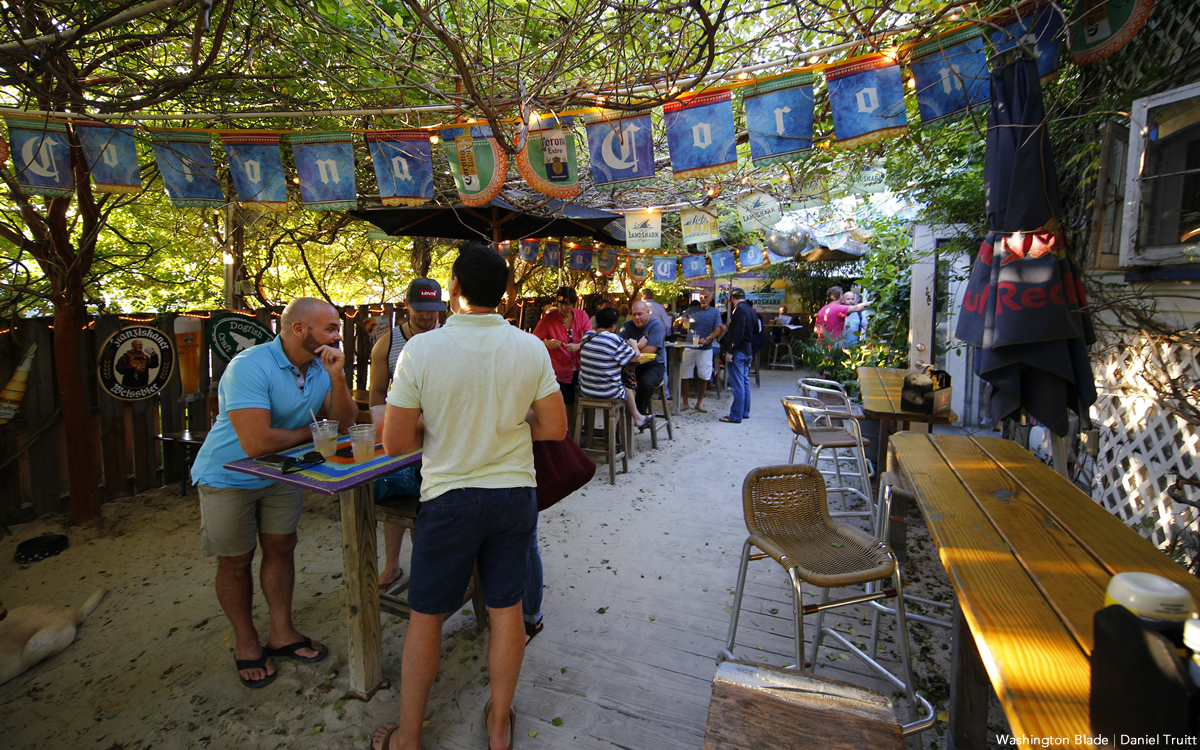

The 2024 New York City Pride Parade wound through the streets of Manhattan and past the historic Stonewall Inn on Sunday, June 30.
(Washington Blade photos by Daniel Truitt)
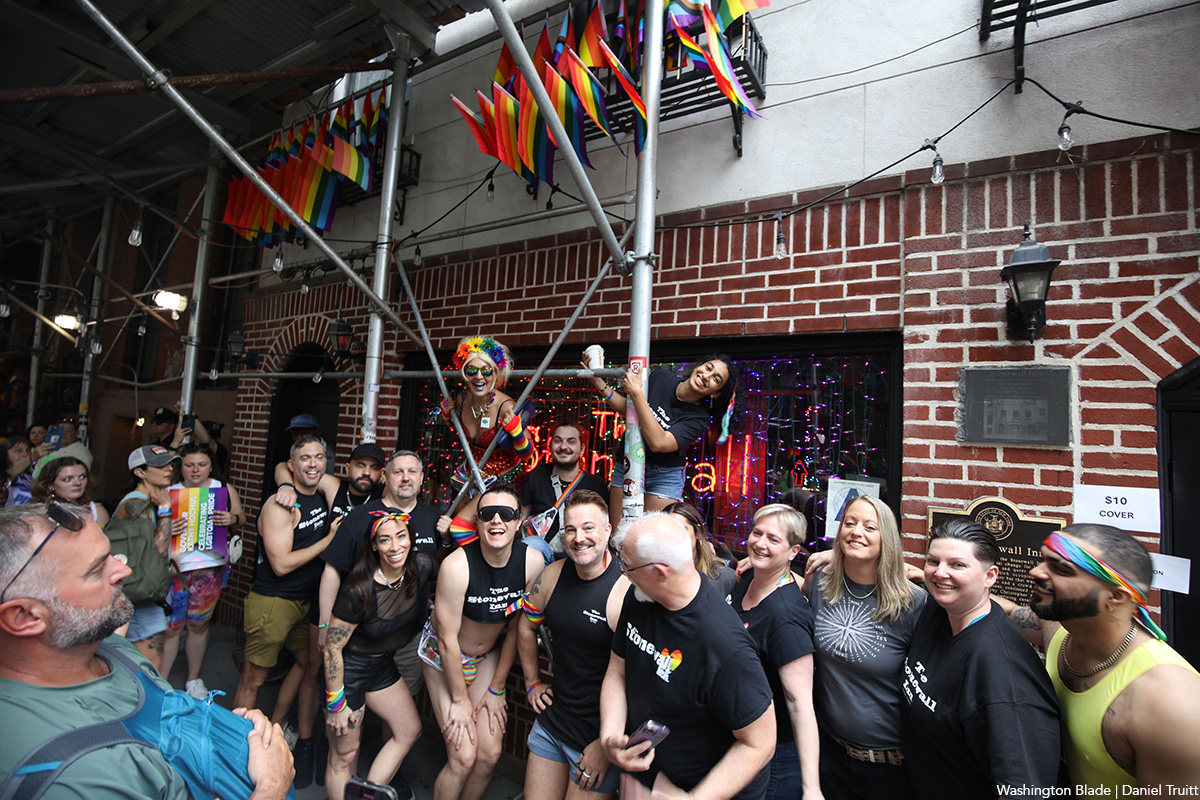
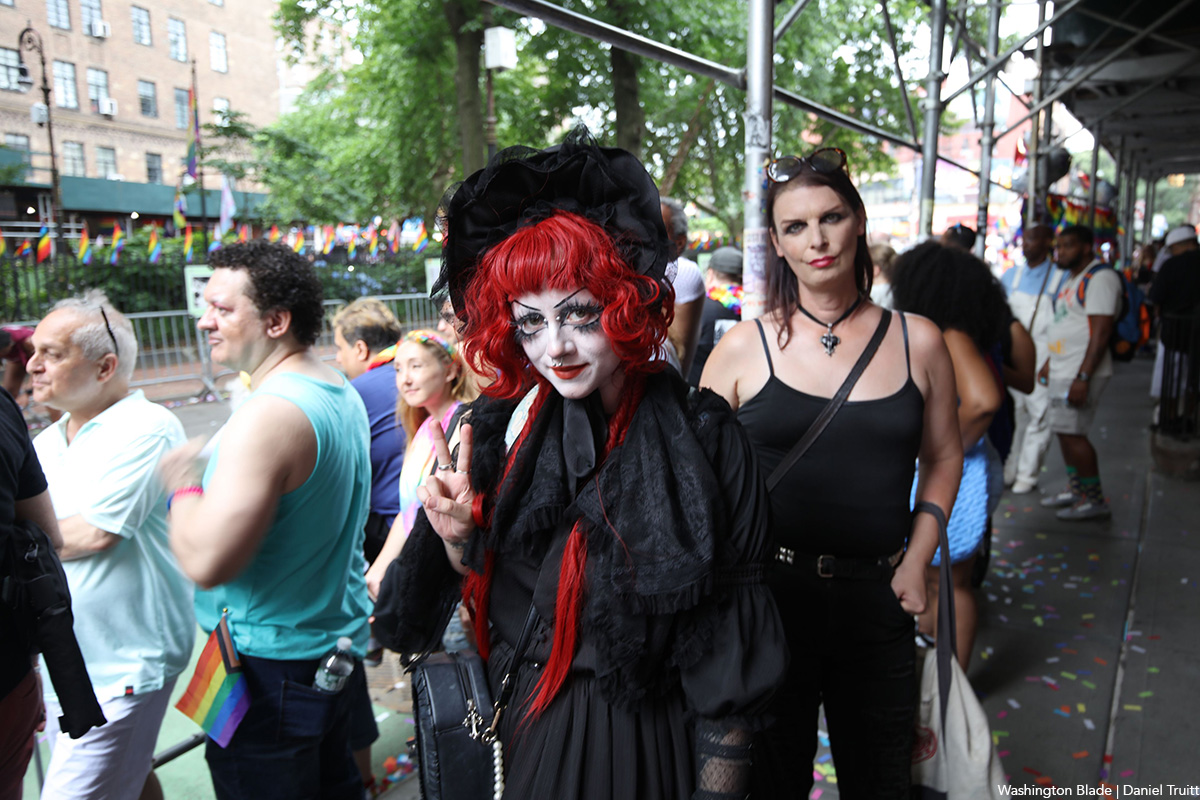
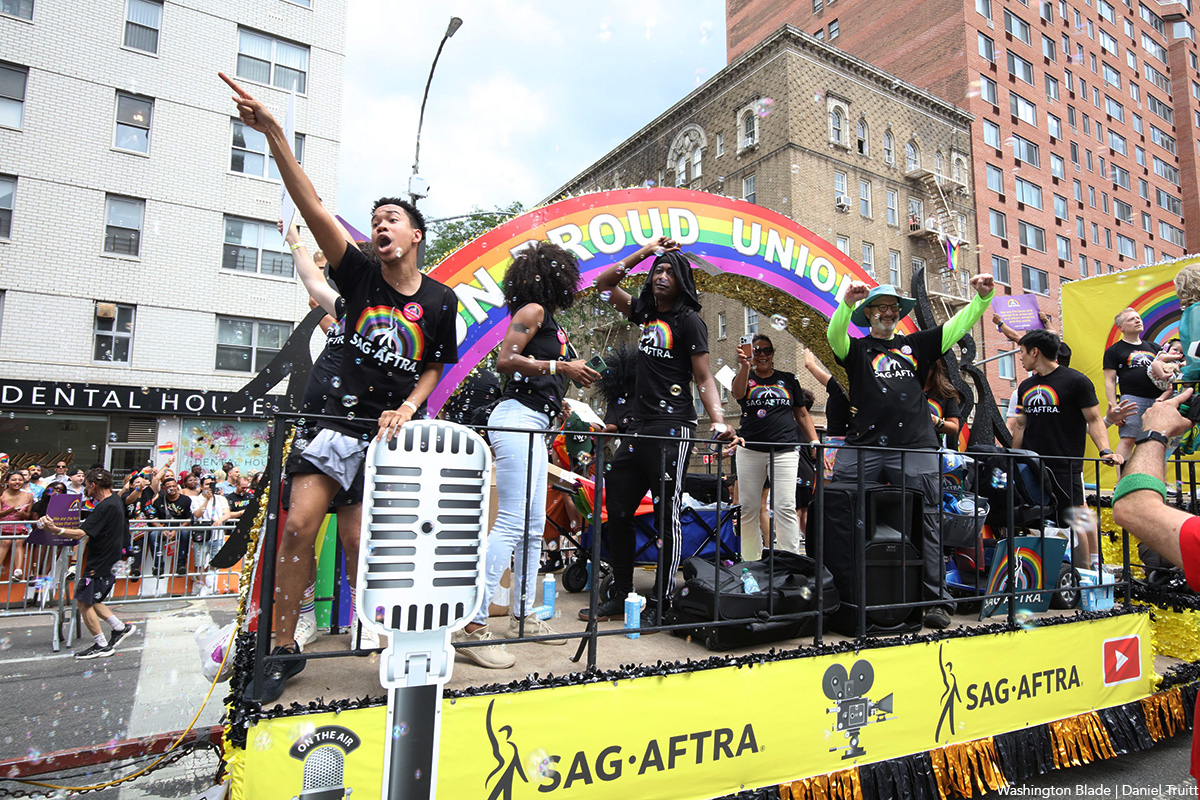
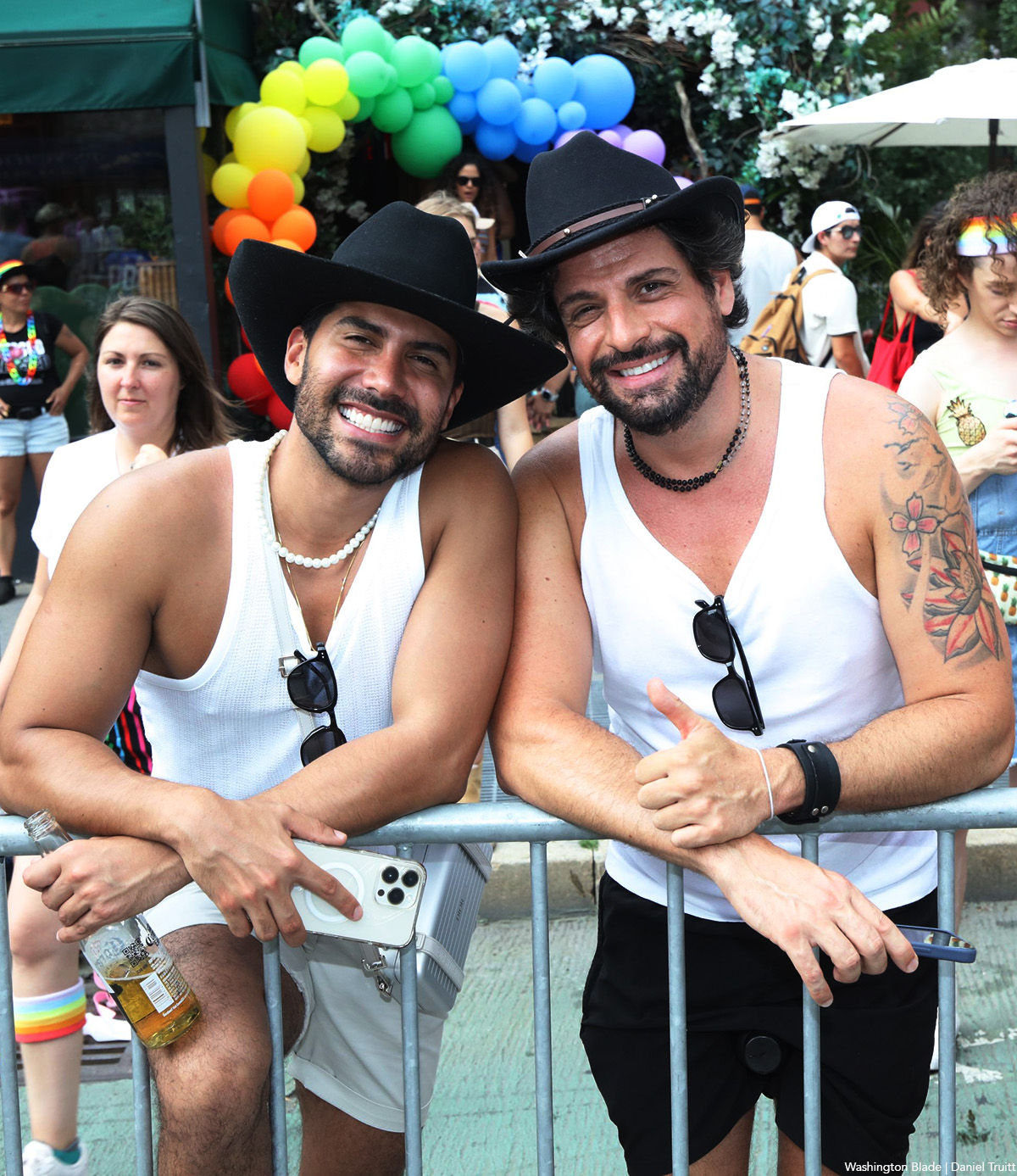
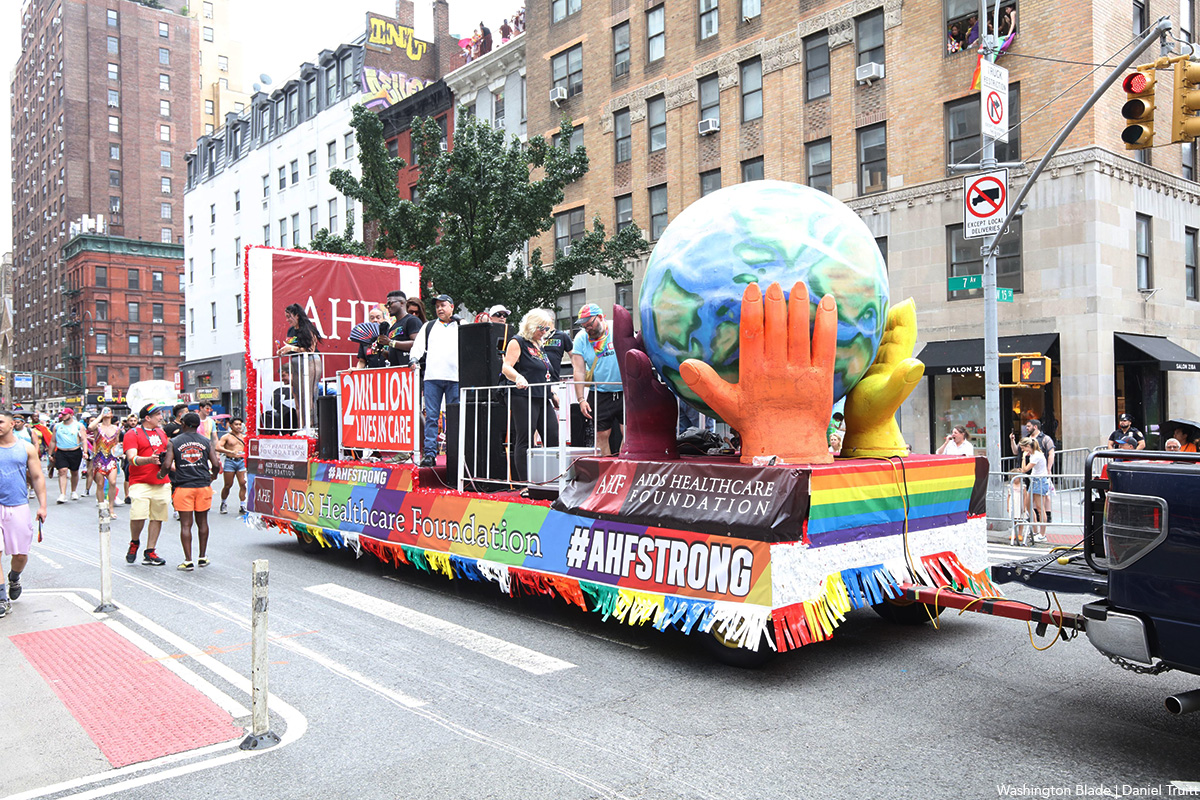
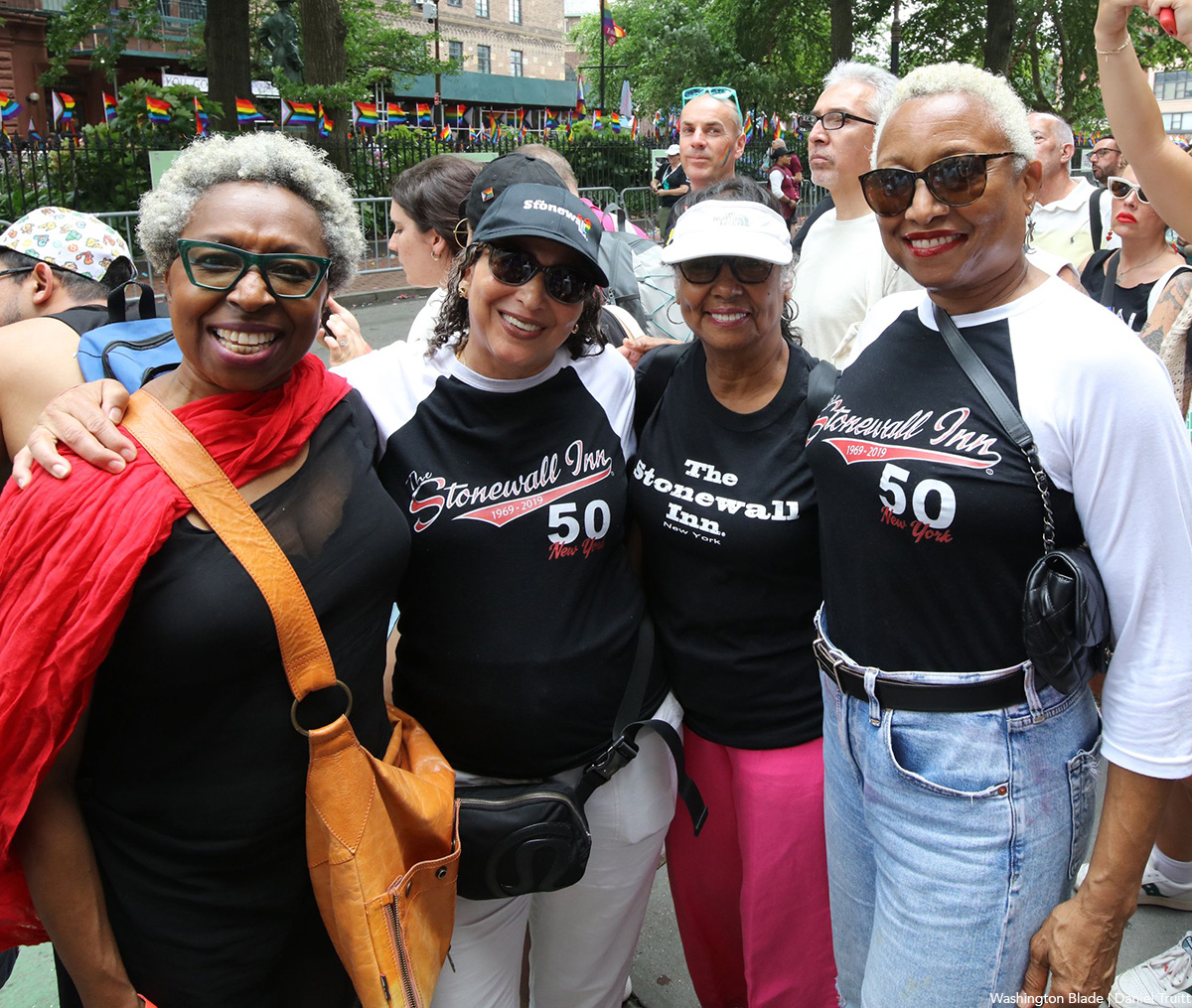
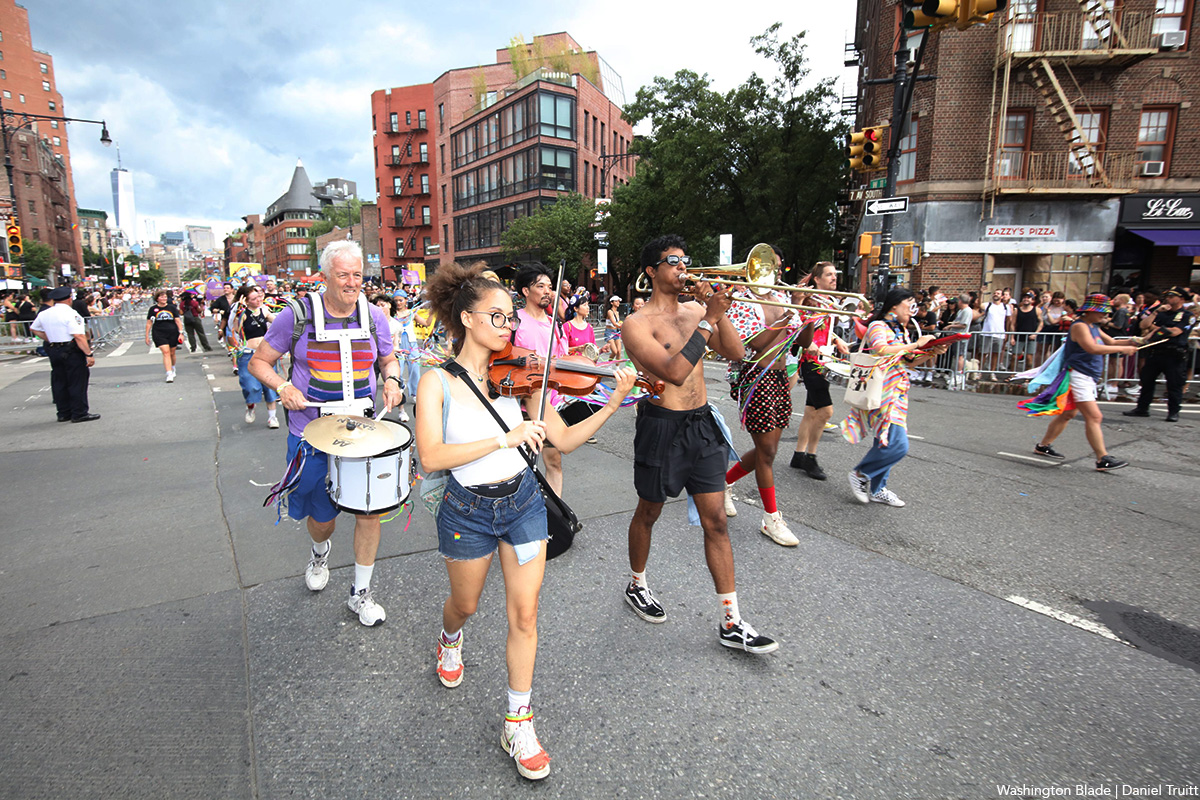
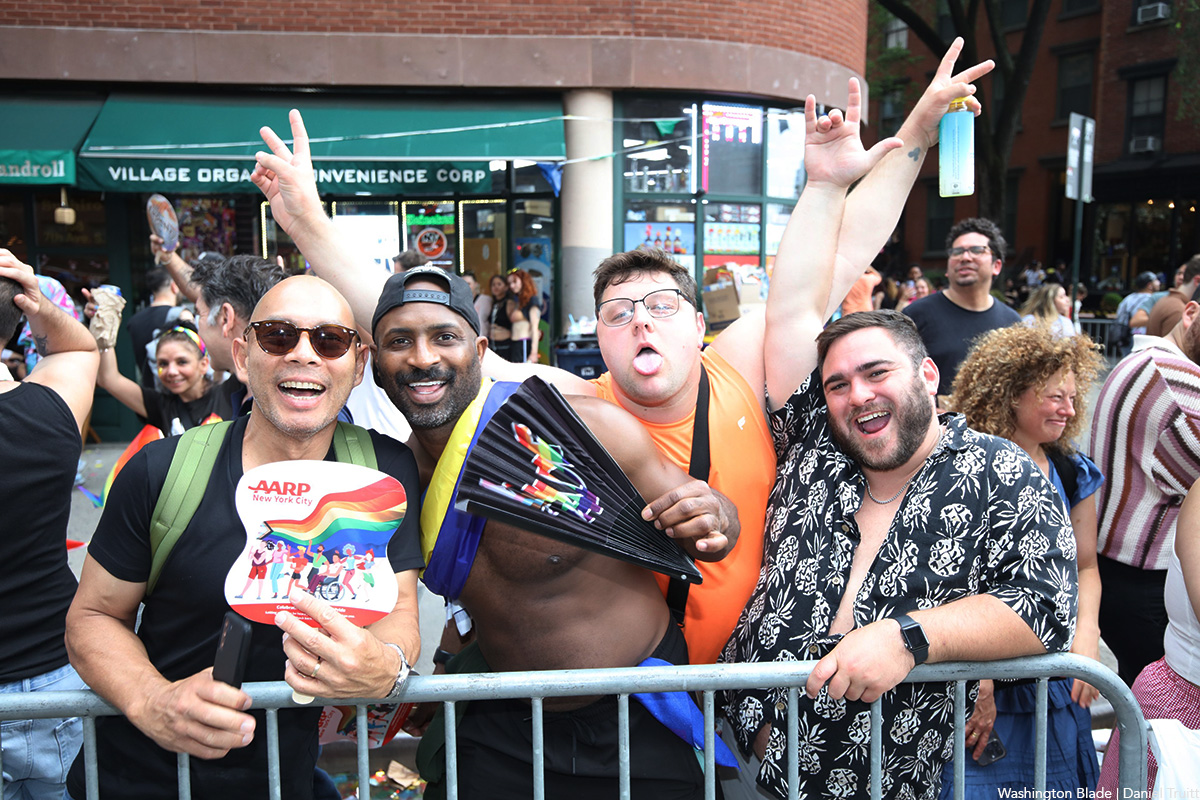
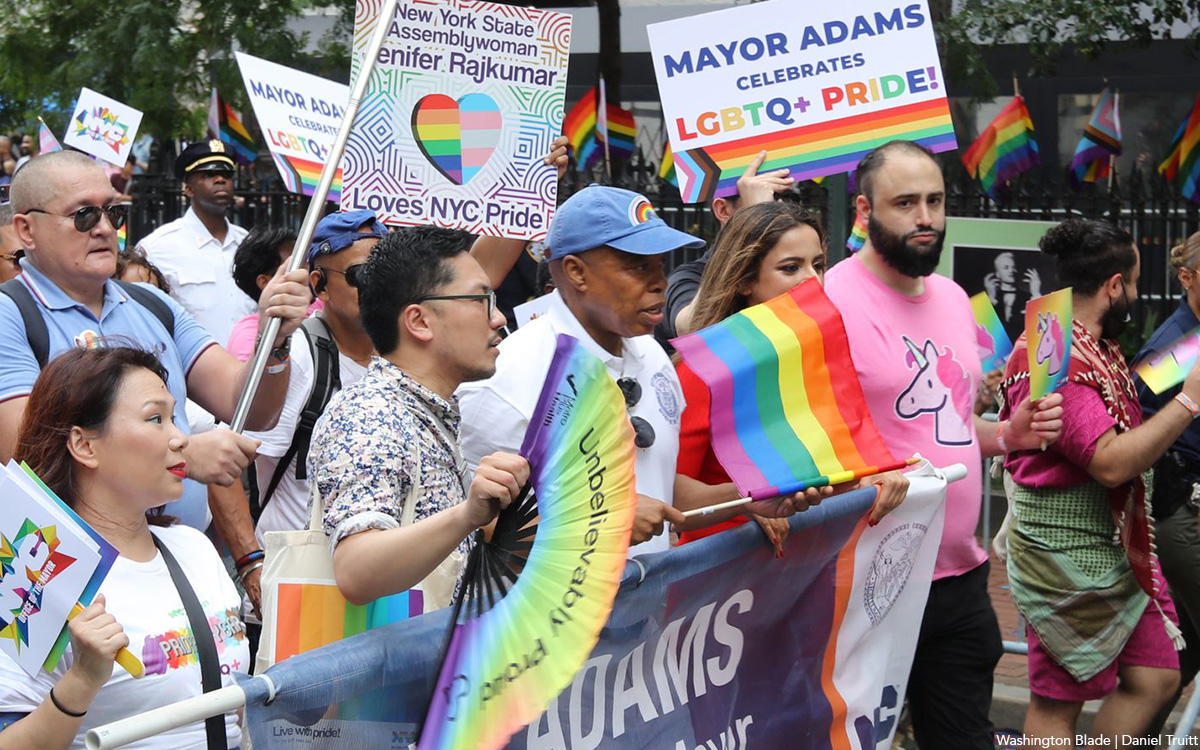
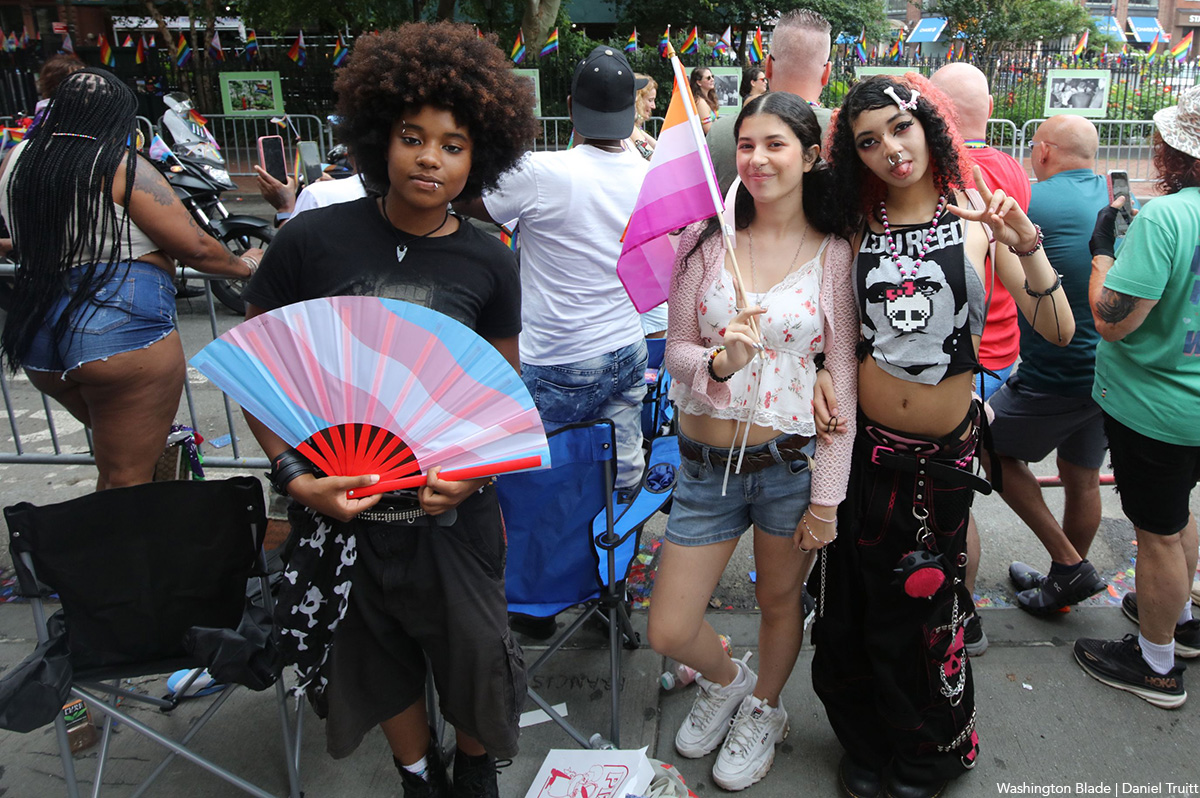
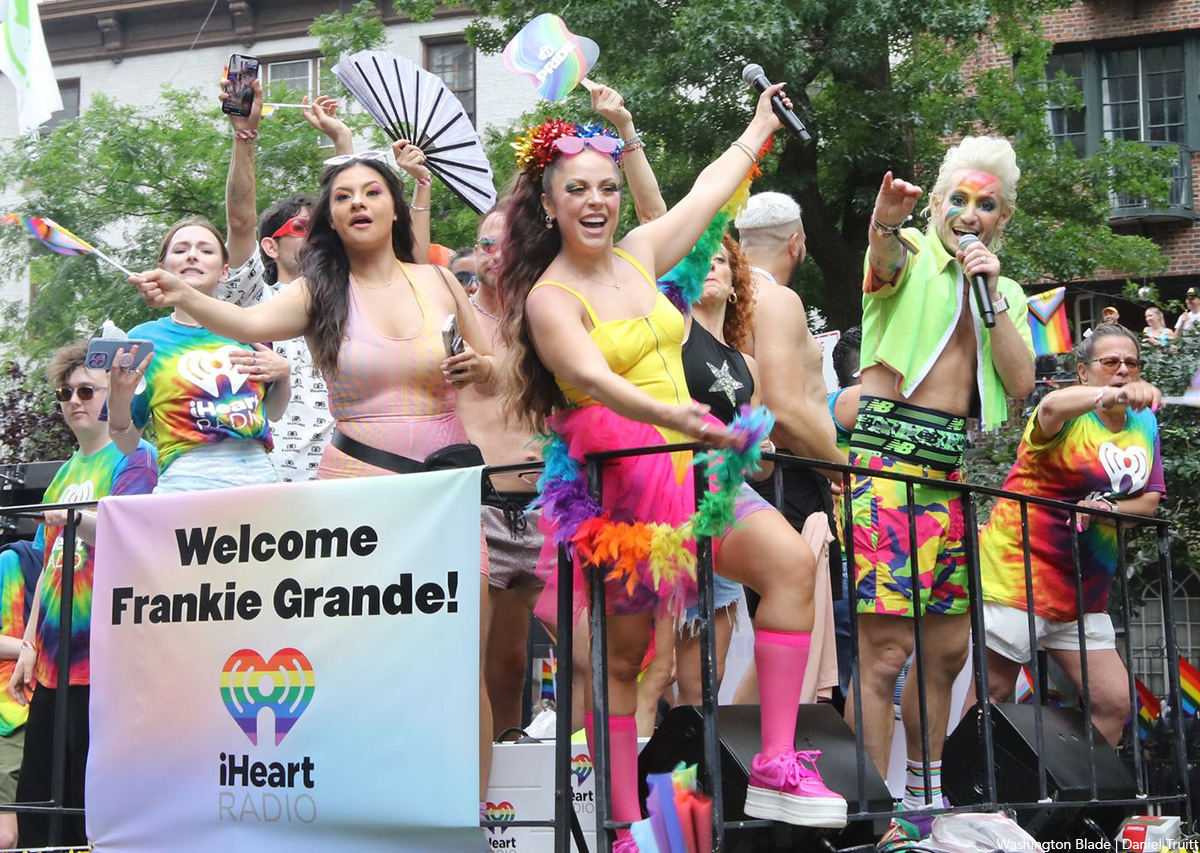
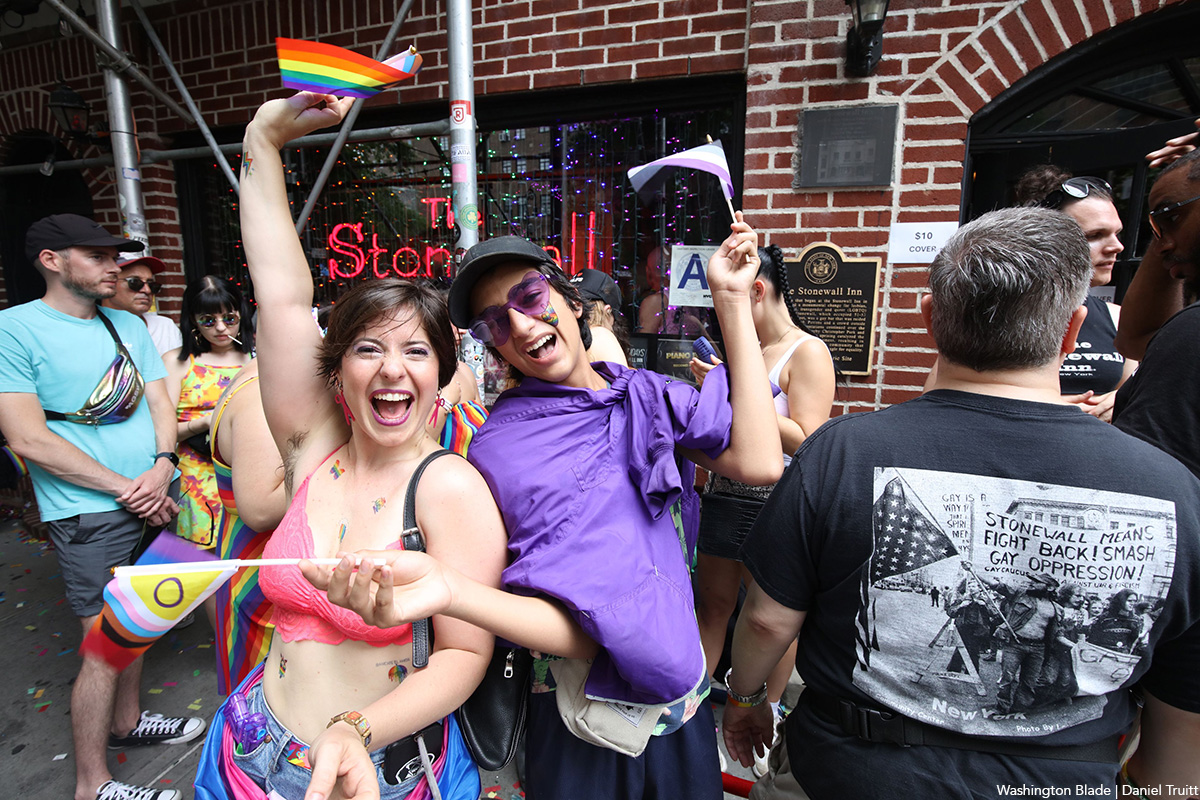
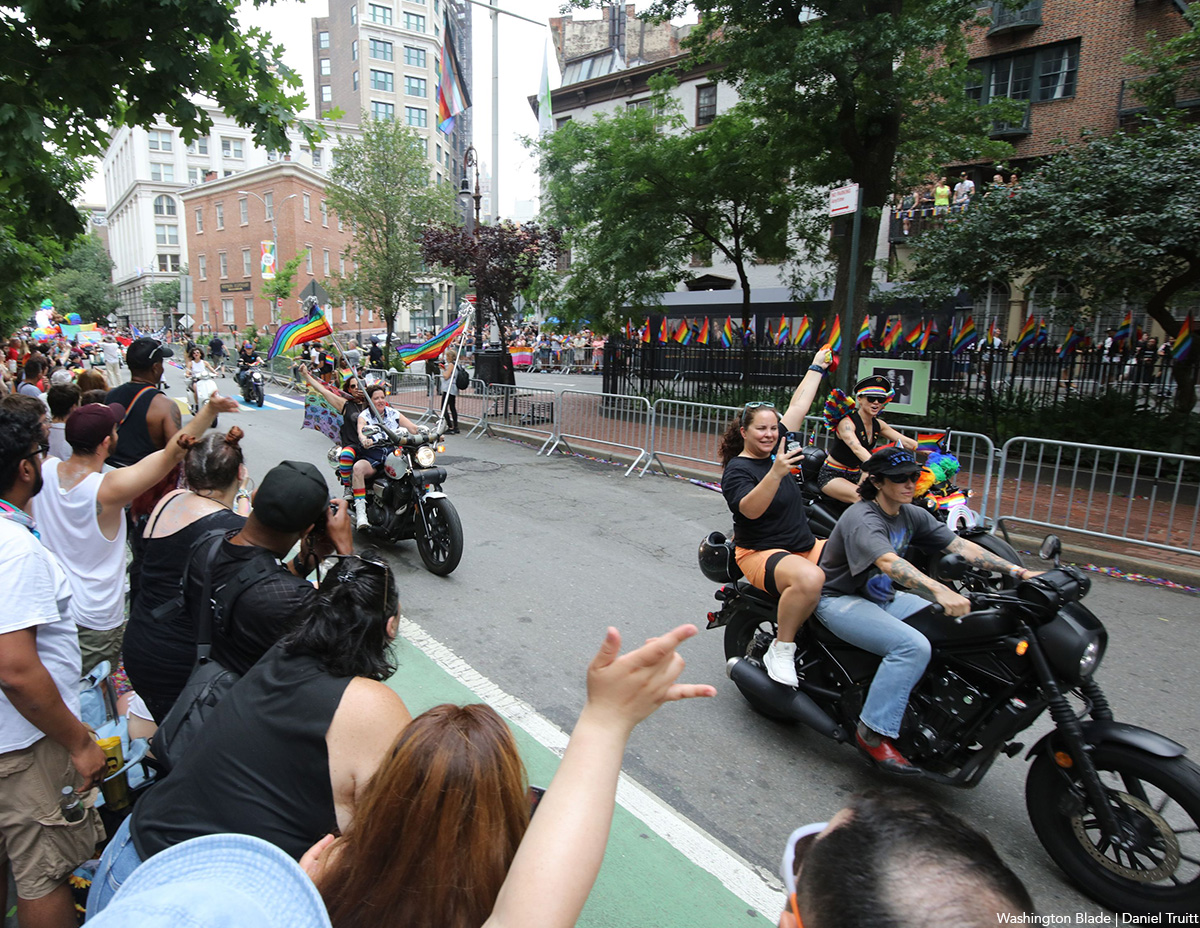
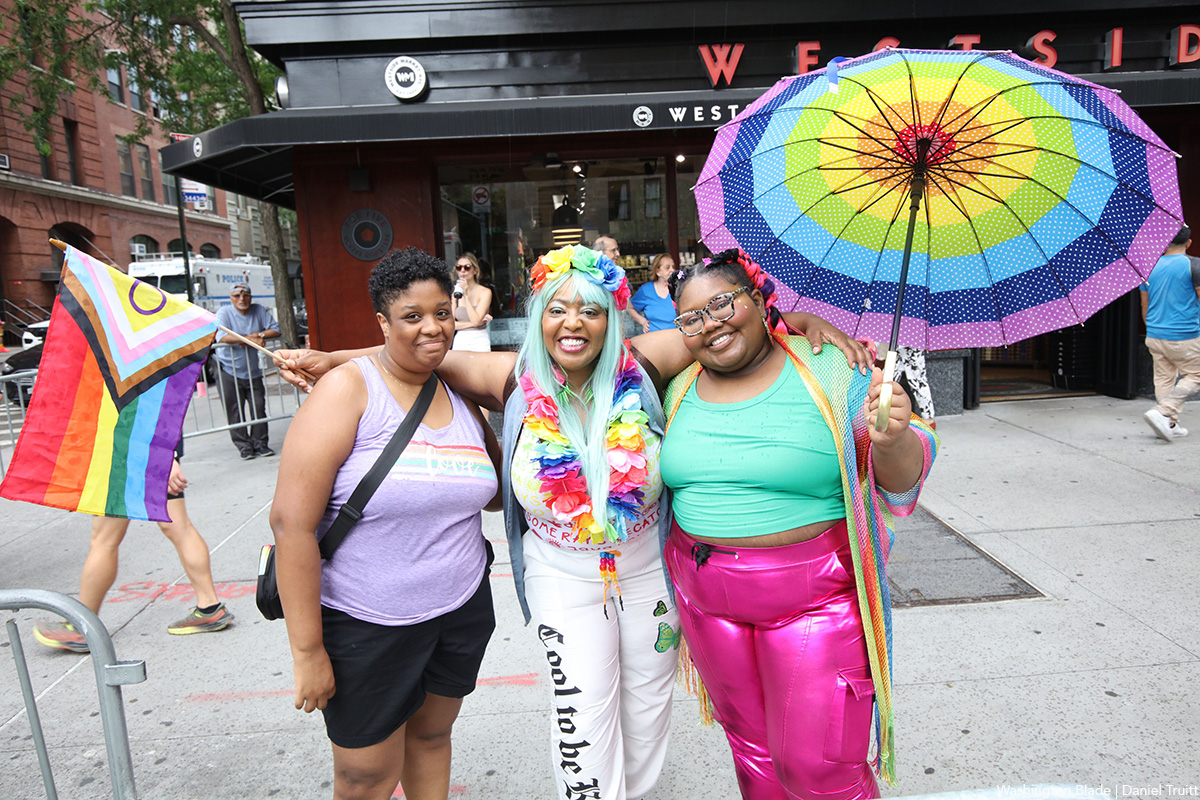
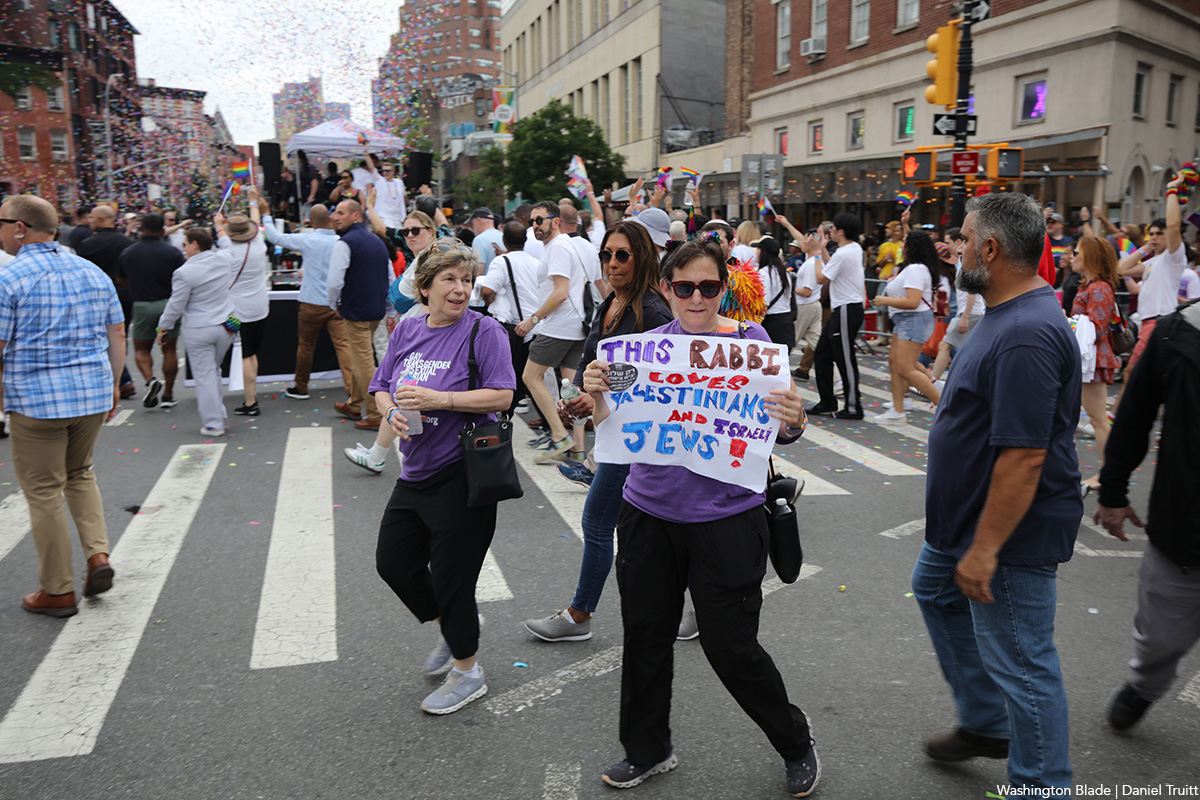
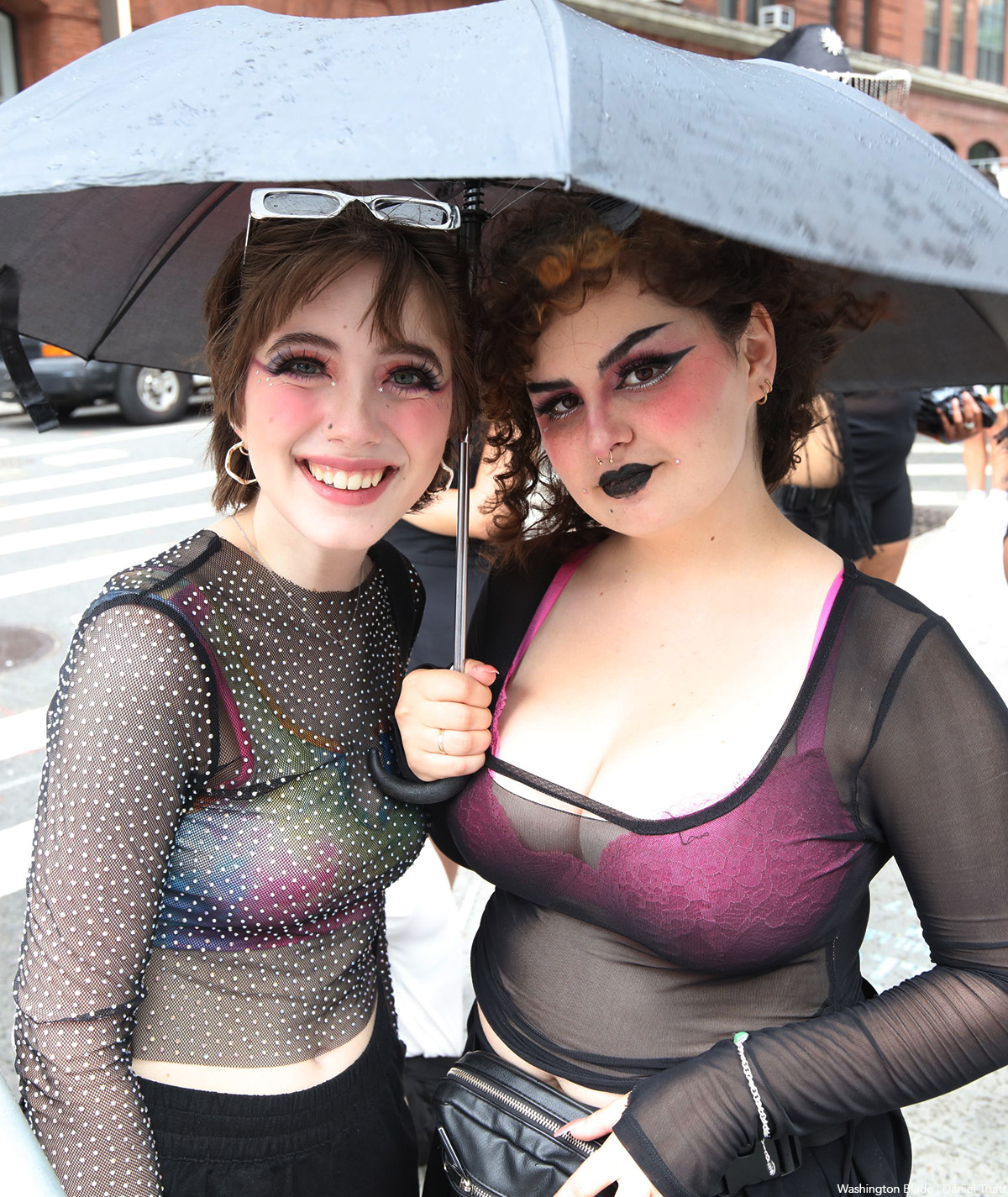
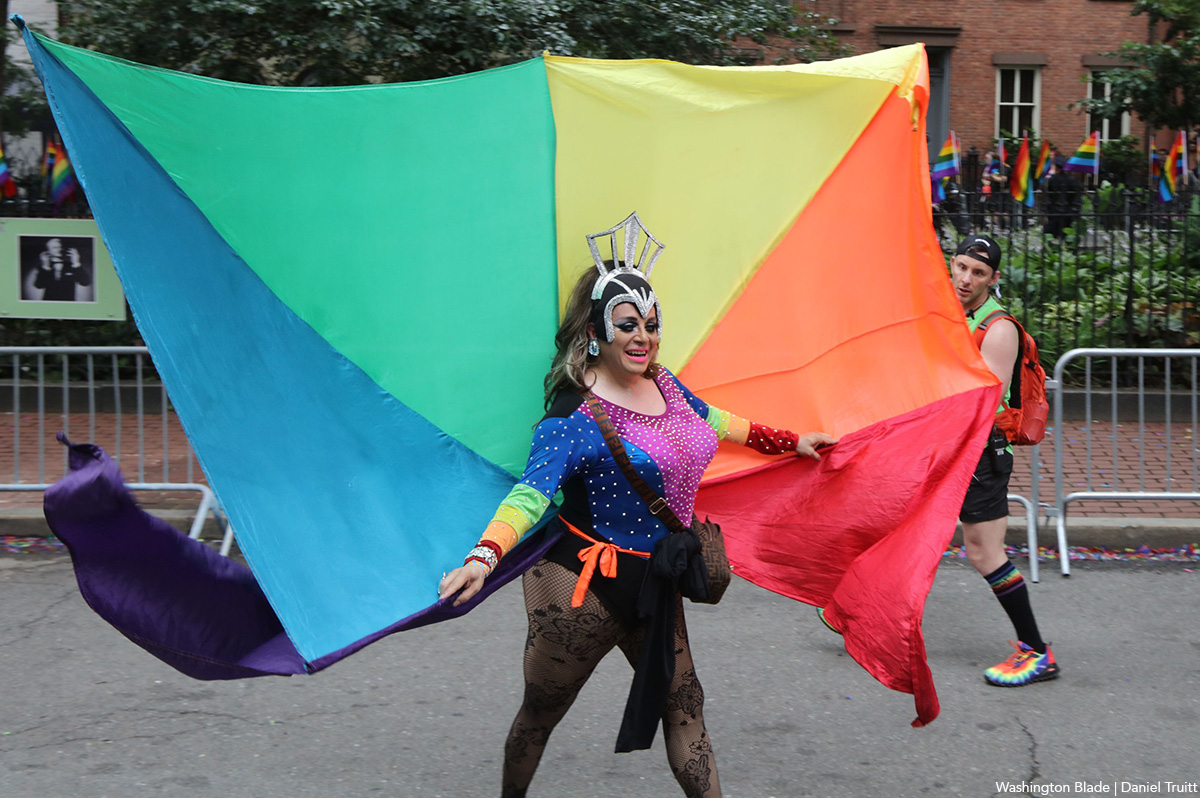
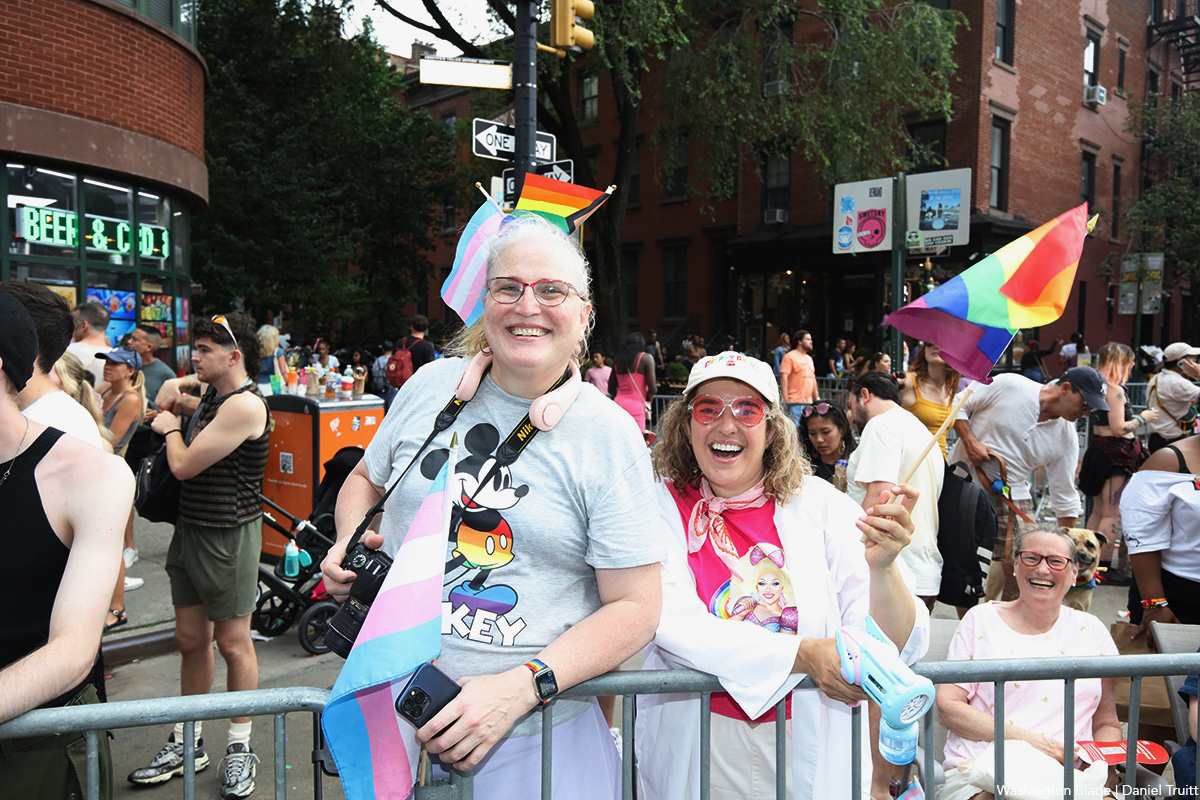
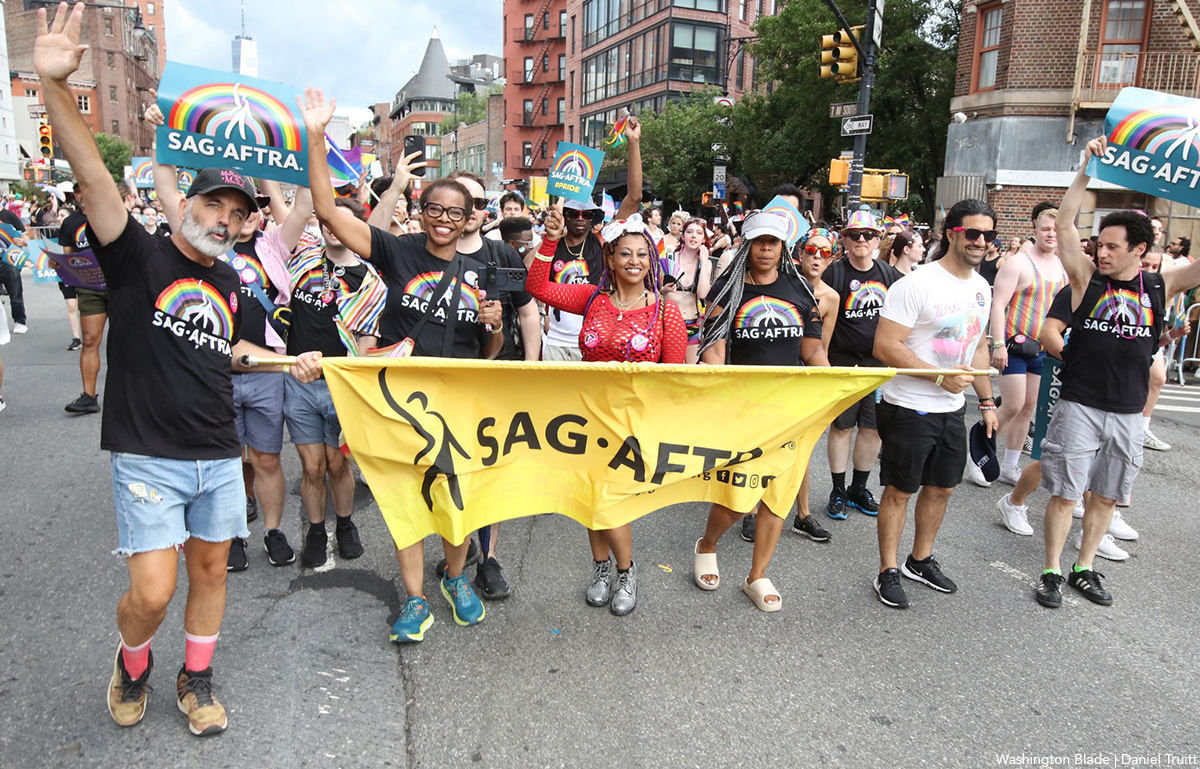
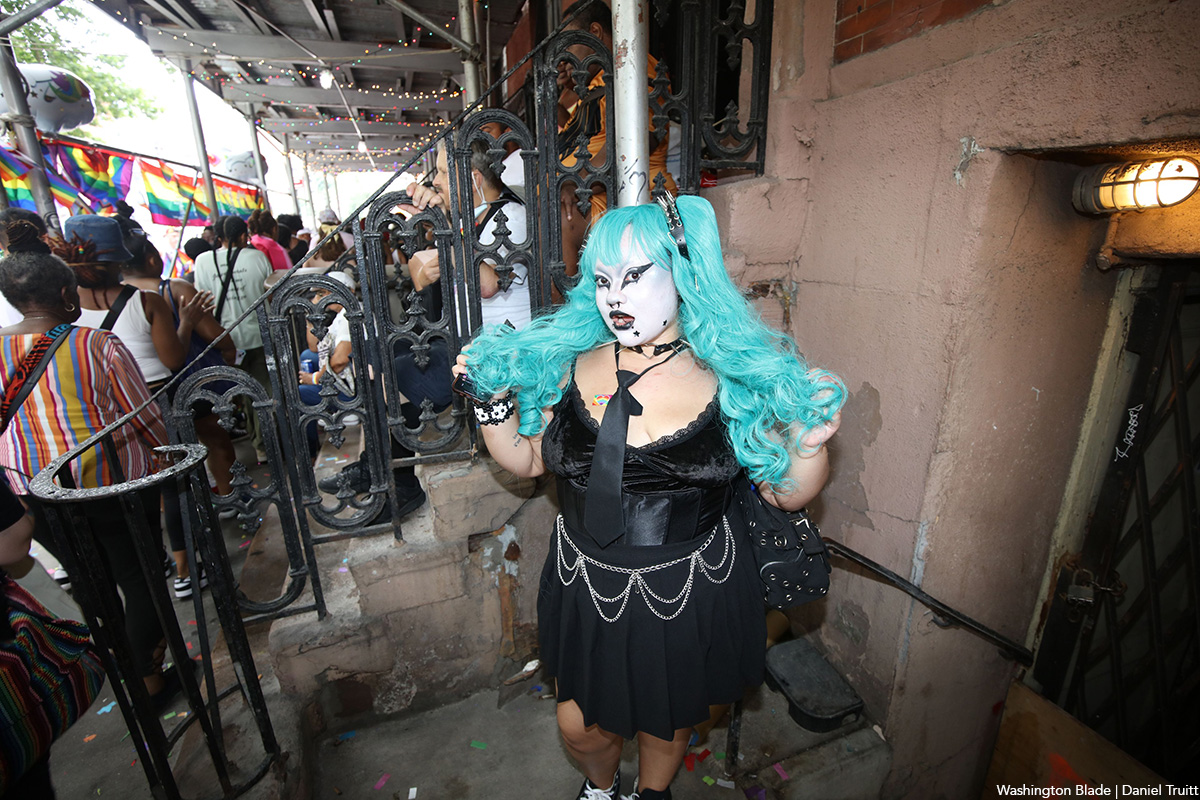
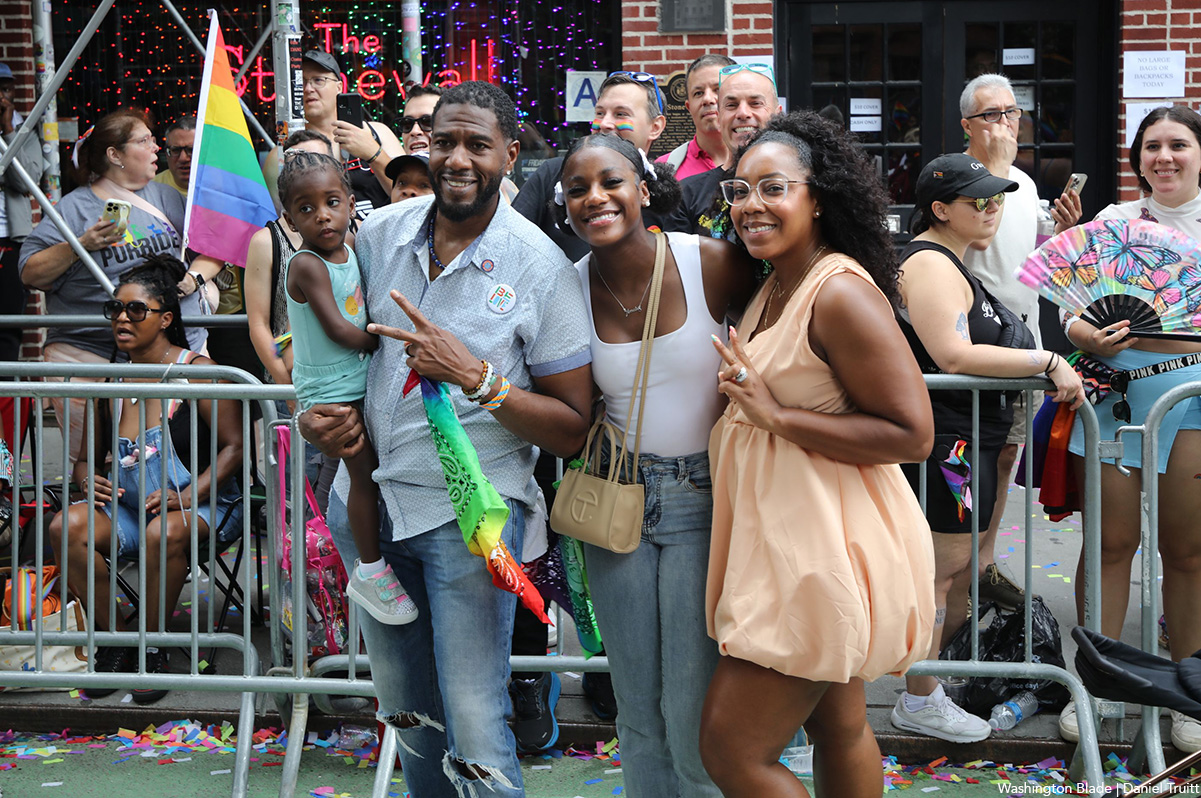
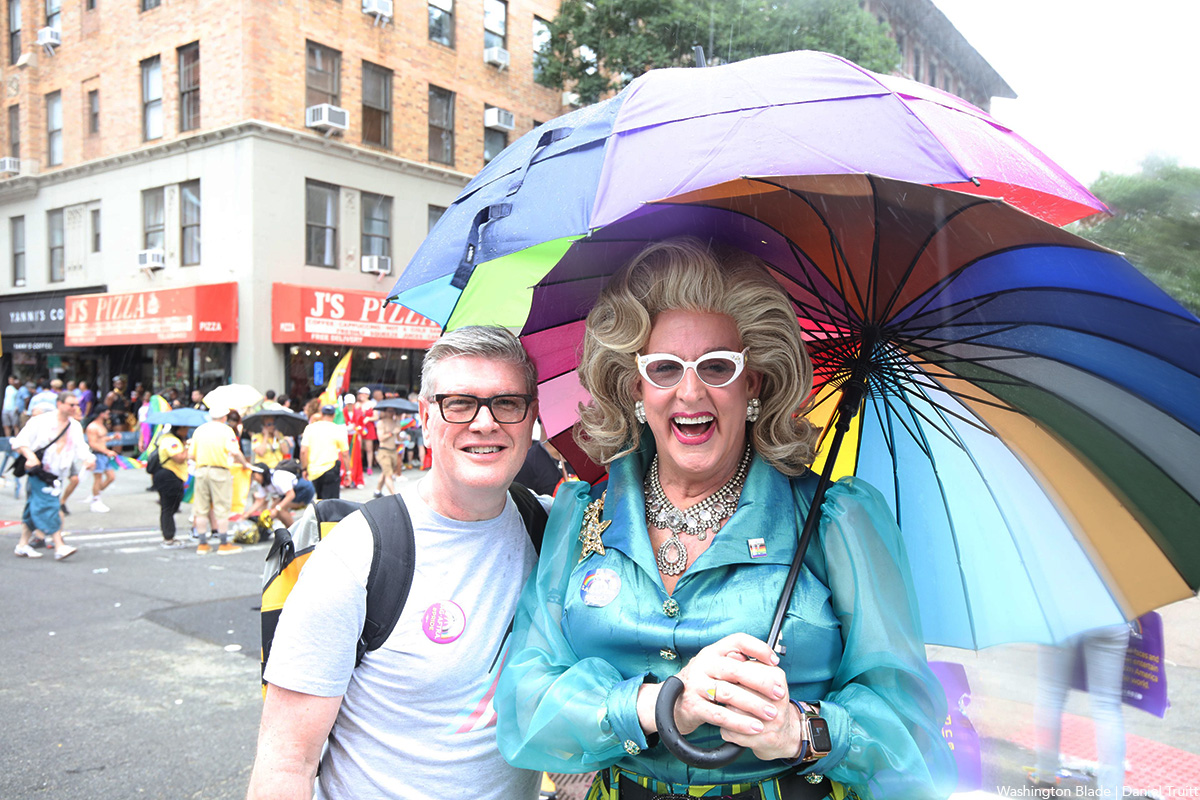
-

 Canada2 days ago
Canada2 days agoToronto Pride parade cancelled after pro-Palestinian protesters disrupt it
-

 Baltimore4 days ago
Baltimore4 days agoDespite record crowds, Baltimore Pride’s LGBTQ critics say organizers dropped the ball
-

 Sports5 days ago
Sports5 days agoHaters troll official Olympics Instagram for celebrating gay athlete and boyfriend
-

 U.S. Supreme Court1 day ago
U.S. Supreme Court1 day agoConcern over marriage equality in US grows two decades after first Mass. same-sex weddings



